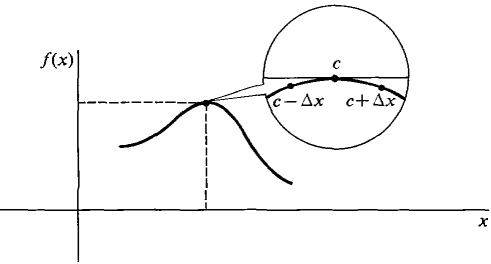| The ebook Elementary Calculus is based on material originally written by H.J. Keisler. For more information please read the copyright pages. |

|

Home  Continuous Functions Continuous Functions  Maxima and Minima Maxima and Minima  Proof of the Critical Point Theorem; Proof of the Critical Point Theorem; |
|






|
|
Proof of the Critical Point Theorem;
Assume that neither (i) nor (ii) holds; that is, assume that c is not an endpoint of I and f'(c) exists. We must show that (iii) is true; i.e., f'(c) = 0. We give the proof for the case that f has a maximum at c. Let x = c, and let Δx > 0 be infinitesimal. Then f(c + Δx) ≤ f(c), f(c - Δx) ≤ f(c). (See Figure 3.5.14.) Therefore
Figure 3.5.14 Proof of the Critical Point Theorem Taking standard parts,
and also, Therefore f'(c) = 0.
|
|
Home  Continuous Functions Continuous Functions  Maxima and Minima Maxima and Minima  Proof of the Critical Point Theorem; Proof of the Critical Point Theorem; |
|
Last Update: 2010-11-25




 ,
,